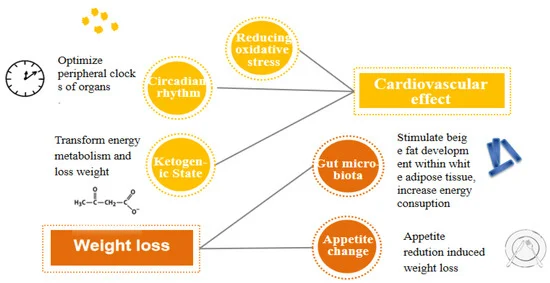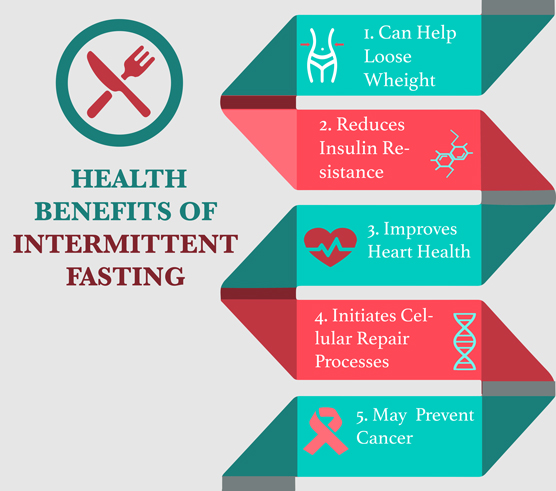Intermittent fasting has taken the health and wellness world by storm, and for good reason. This time-honored practice isn’t just another fad diet; it’s a powerful tool that can revolutionize your metabolic health. As a medical doctor and health blogger, I’m excited to share with you the lesser-known benefits of intermittent fasting that can transform your overall well-being.
What is Intermittent Fasting?
Before we dive into the benefits, let’s clarify what intermittent fasting actually is. Simply put, it’s an eating pattern that alternates between periods of fasting and eating. Unlike traditional diets that focus on what you eat, intermittent fasting is all about when you eat.
There are several popular methods of intermittent fasting, including:
- The 16/8 method: Fasting for 16 hours and eating within an 8-hour window
- The 5:2 diet: Eating normally for 5 days and restricting calories for 2 non-consecutive days
- Eat-Stop-Eat: A 24-hour fast once or twice a week
Now, let’s explore the fascinating ways intermittent fasting can boost your metabolic health.

1.Improved Insulin Sensitivity and Glucose Control
One of the most significant metabolic benefits of intermittent fasting is its impact on insulin sensitivity and glucose control. When we fast, our bodies become more responsive to insulin, the hormone responsible for regulating blood sugar levels.
Research has shown that intermittent fasting can lead to a reduction in fasting insulin levels and improved insulin sensitivity. This is crucial for metabolic health, as insulin resistance is a key factor in the development of type 2 diabetes and other metabolic disorders.
“Intermittent fasting is not just about weight loss; it’s about optimizing your body’s ability to use insulin effectively, which is fundamental to metabolic health.” – Dr. Jason Fung, author of “The Complete Guide to Fasting”
2.Enhanced Fat Burning Through Metabolic Switching
One of the most intriguing aspects of intermittent fasting is its ability to induce “metabolic switching.” This process occurs when your body shifts from using glucose as its primary fuel source to burning stored fat for energy.
During fasting periods, your body depletes its glucose stores and begins to break down fat cells for fuel. This metabolic flexibility not only aids in weight loss but also improves overall metabolic health by reducing fat accumulation in the liver and other organs.

3.Positive Effects on Lipid Profiles
Intermittent fasting has been shown to have a positive impact on lipid profiles, which are key indicators of cardiovascular health. Studies have demonstrated that fasting can lead to:
- Reduced total cholesterol levels
- Lowered LDL (bad) cholesterol
- Increased HDL (good) cholesterol
- Decreased triglyceride levels
These improvements in lipid profiles can significantly reduce the risk of heart disease and stroke, making intermittent fasting a powerful tool for cardiovascular health.
4.Hormonal Changes That Boost Metabolism
Intermittent fasting triggers a cascade of hormonal changes that can have profound effects on your metabolism. One of the most notable changes is an increase in human growth hormone (HGH) production.
HGH plays a crucial role in metabolism, fat burning, and muscle growth. During fasting periods, HGH levels can increase dramatically, sometimes by as much as 500%. This surge in HGH can lead to increased fat burning, improved muscle tone, and even potential anti-aging effects.
5.Circadian Rhythm Regulation
Our bodies operate on a 24-hour cycle known as the circadian rhythm, which influences various metabolic processes. Intermittent fasting, particularly time-restricted eating, can help align our eating patterns with our natural circadian rhythms. By limiting food intake to specific hours of the day, we can optimize our metabolism and improve various aspects of our health, including:
- Better sleep quality
- Improved digestion
- Enhanced cognitive function
- Increased energy levels
6.Reduced Inflammation and Oxidative Stress
Chronic inflammation and oxidative stress are underlying factors in many metabolic disorders and age-related diseases. Intermittent fasting has been shown to reduce markers of inflammation and oxidative stress in the body. This anti-inflammatory effect can have far-reaching benefits for metabolic health, potentially reducing the risk of conditions such as:
- Type 2 diabetes
- Cardiovascular disease
- Certain types of cancer
- Neurodegenerative disorders.
7.Potential for Weight Loss and Body Composition Improvements
While not the primary focus of this article, it’s worth noting that intermittent fasting can be an effective tool for weight loss and improving body composition. By reducing overall calorie intake and promoting fat burning, intermittent fasting can lead to:
- Reduced body weight
- Decreased body fat percentage
- Preservation of lean muscle mass
- Improved metabolic rate
These changes in body composition can further enhance metabolic health and reduce the risk of obesity-related disorders.

Implementing Intermittent Fasting for Metabolic Health
Now that we’ve explored the benefits, you might be wondering how to get started with intermittent fasting. Here are some tips for implementing this practice safely and effectively:
- Start gradually: Begin with a 12-hour fasting window and gradually increase it over time.
- Stay hydrated: Drink plenty of water during fasting periods to stay hydrated and help manage hunger.
- Choose nutrient-dense foods: When you do eat, focus on whole, unprocessed foods that provide essential nutrients.
- Listen to your body: Pay attention to how you feel and adjust your fasting schedule as needed.
- Consider your lifestyle: Choose a fasting method that fits well with your daily routine and commitments.
Addressing Common Concerns and Side Effects
While intermittent fasting can offer numerous benefits, it’s important to be aware of potential side effects and who should avoid this practice. Some people may experience:
- Initial hunger and irritability
- Headaches
- Fatigue or low energy (usually temporary)
It’s crucial to note that intermittent fasting may not be suitable for everyone. Pregnant women, individuals with a history of eating disorders, and those with certain medical conditions should consult with a healthcare provider before starting any fasting regimen.
Conclusion: Embracing Intermittent Fasting for Metabolic Health.
Intermittent fasting offers a unique and powerful approach to improving metabolic health. By harnessing the body’s natural fasting response, we can unlock a range of benefits that go far beyond simple weight loss.
From enhanced insulin sensitivity and improved lipid profiles to reduced inflammation and hormonal optimization, intermittent fasting has the potential to transform your metabolic health and overall well-being.
As with any significant lifestyle change, it’s essential to approach intermittent fasting with knowledge and caution. Listen to your body, start gradually, and consult with a healthcare professional if you have any concerns.
By incorporating intermittent fasting into your lifestyle, you may discover a sustainable and effective way to optimize your metabolic health and enjoy the many benefits this practice has to offer.
For the latest research on intermittent fasting and metabolic health, check out this recent study published in the New England Journal of Medicine: [Intermittent Fasting and Metabolic Health]
https://www.nejm.org/doi/full/10.1056/NEJMra1905136
Remember, the journey to better health is a personal one, and intermittent fasting is just one tool in your arsenal. Embrace the process, stay informed, and enjoy the potential benefits of this fascinating approach to metabolic health.

